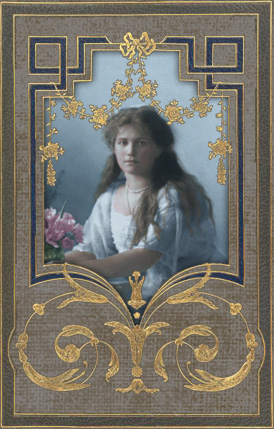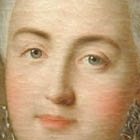This is my regular job, I am the lead designer for Pallasart in Austin. I spend around 10 hours everyday in front of a computer.







CHAPTER 5
CONCERNING EASTER
THAT year spring came unusually early and when we returned to St. Petersburg for Easter the river was already open for navigation, so we did not see the ceremony.
Easter is the great feast of the year in Holy Russia. The long severe fast of seven weeks is over. Many people in Russia eat no meat, butter, eggs, or milk, all through Lent. In the palace, however, we only observed three weeks-the first, fourth, and last. Many of the suite also fasted every Wednesday and Friday. The week before Lent begins is called" Butter week."
Russian pancakes are served twice a day. The Russians begin their lunch or dinner with pancakes, and they are eaten with caviare and sour cream. During the sixth -week the great fair called Verba is held. The word means willow, and the fair is so called because great bunches of willow wands covered with catkins are sold. These wands are carried into the churches on Palm Sunday and are blessed by the priests; they are then canied home and carefully placed in jars of water in the windows of the houses. They soon begin to bud and throw out roots. They are allowed to remain until Whitsuntide, when they are taken into the country and planted. These wands are supposed to be typical of the palms spread before our Saviour.
At the Verba one finds many pretty and curious things-Russian lace and needlework may be picked up at very moderate prices; there are also quaint Russian toys and all manner of wooden articles. They also sell little figures in small bottles; these figures jump up and down in the funniest fashion when the piece of skin on the top of the bottles is pressed down. They are called American devils, but last year the name was changed to Japanese devils. There are also thousands of the coloured eggs which are indispensable to a Russian Easter. We used to colour a couple of hundred every Good Friday, in the nurseries. It was a great pleasure to .the children, but rather dirty work. However, Easter, like Christmas, comes but once a year.
On Thursday in Passion Week the children went to Holy Communion. This yearly Communion is always a great festival and holiday in Russia, for the Russian church administers the Sacrament only once a year. In preparation for it the candidate fasts for a week, going to church both morning and evening for the seven days. He then confesses his sins to the priest, receives absolution and asks pardon of all in the house who might have been offended during the past year. On the morning of the day a special costume is donned, married women generally keep their wedding dress for those occasions; they also wear a cap, while the unmarried women go bare-headed to the Sacrament.
The bread is broken into the wine and water and is administered with a spoon, a napkin having been tied round the neck of the communicant. On returning from the church all the friends come forward and present their congratulations, flowers and bonbons are sometimes given, and the rest of the day is observed as a holiday. The rite of Confirmation is administered immediately after baptism, and children up to the age of seven years can receive the Communion as often as every month. After that age confession and church-going are essential, before receiving the Communion.
The little Grand Duchess Olga made her first confession in Moscow, during Lent, I903, and she received a gift from the children of Moscow, of an icon of the Virgin Mary. Face and hands are painted, all draperies, etc., are executed in pearls.
The Midnight Mass is celebrated the night between Easter Saturday and Sunday. It lasts for about three hours, beginning at eleven o'clock at night. A bier, containing a figure representing the dead body of our Lord, is carried into the church. The bier in St. Isaak's Cathedral is of solid silver, weighs a couple of tons, and was presented by the Cossacks. I t is moved on wheels. Each person on coming into the church kisses the painted hands and feet and kneels and prays for a few seconds. The Mass has begun, the church is dimly lighted. Just at midnight the priest chants" Christ is risen," the choir answers" He is risen indeed." Each kisses his neighbour, and in a moment the scene is changed from sorrow and mourning to joy and gladness. The dead Christ is carried out of the church. Chandeliers are all fitted with a piece of prepared cord running round them; this cord is fired and in a moment all the candles are alight. Lighted tapers are put into the hands of the worshippers, a Te Deum is sung, after which all return home and eat a heavy supper.
All the food must be bought on Easter Saturday, as nothing which has been in the house during Lent can be eaten. A priest visits the houses of well-to-do parishioners and blesses all food, receiving a fee for so doing. He then goes into the markets and blesses. everything which is for sale.
The supper generally consists of cold roast veal, ham, chickens, hard-boiled eggs, various kinds of cakes all decorated with bunches of paper. flowers bought at the Verba, and wine, and quass, which is a kind of cider. They say that blessed food cannot do one any harm, so it may be their faith which keeps the people from indigestion, certainly I have seen dyspeptic people eat heartily of this supper and suffer no inconvenience. I t seems that the mind has great influence over the body, and the meal is eaten with much joy and laughter. In workshops the proprietor prepares the supper and offers it to his employees.
The Greek Church orders that no service should be held on Easter Sunday; however, the church bells ring all day. Many Russian people go on Easter Sunday to the English and Lutheran churches.
During Easter week the Russian never goes out without a hard-boiled and coloured egg in his pocket. On meeting an acquaintance he says" Christ is risen," the answer comes, they then kiss each other three times and exchange eggs. The shops are all closed for that week except for a couple of hours in the morning, and everyone makes holiday. On Easter Monday the ceremony of greeting the troops is held in the Winter Palace. In one of the great halls the soldiers, numbering about five thousand, are drawn up. The Emperor advances, shakes hands, and says, "Christ is risen," the soldier replies; the Emperor kisses him three times, and the man then advances to the Empress, kisses her hand, presents a hard-boiled egg and receives from her a painted porcelain one. He then files out of the room, and another takes his place. So it goes on until they have all personally saluted the Emperor and Empress. I t is very wearisome. On Easter Sunday the Emperor kisses all the men of his household, and the Empress kisses all the women.
One day during Eastertide we were out driving on the Nevski Prospect, and the little Grand Duchess Olga was not good. I was speaking to her, trying to induce her to sit down quietly, when suddenly she did so, folding her hands in front of her. In a few seconds she said to me, "Did you see that Policeman?" I told her that was nothing extraordinary, and that the police would not touch her. She replied,'" but this one was writing something; I was afraid he might have been writing' I saw Olga, and she was very naughty.'" I explained that this was very unlikely, and she reminded me, rather reproachfully, that one day, some time before, she had seen a drunken woman arrested in the street, and had wished me to tell the police not to hurt her. I "had refused to interfere, saying that the woman was naughty and the police quite right in taking her. I now explained that one had to be quite big and very naughty indeed before the police would take one to prison. On returning home she made particular inquiries as to whether a policeman had come while she was out. When she went to see her parents that afternoon she recounted the whole story to her father, telling him that I said it was quite possible to live without going to prison. She then asked her father if he had ever been a prisoner; the Emperor answered that he had never been quite naughty enough to go to prison. Her remark then was: "Oh! how very good you must have been, too."
We stayed about two days in St. Petersburg and then returned to Tsarskoe Selo. Spring comes on so quickly in Russia that on our return the whole country was green and lovely, the birds were singing and every place was glorious with the beauty of spring time.
The wife of Alexander II. loved cowslips. She imported some from Germany and had them planted in the park .at Tsarskoe Selo. They throve very well and are now found as far away as Peterhoff, which is about thirty miles on the other side of St. Petersburg. The French call them the cuckoo flower, and both French and Swiss have a great love for the pretty, fragrant, yellow flower. A Swiss told me once that he considered it the most poetic flower that blows. There are no primroses in Russia. The climate is too dry for them. Attempts have been made to naturalise them, but without success.
We stayed at Tsarskoe Selo till early in May, when we went to Peterhoff, the summer residence in the Gulf of Finland. Here there are many Imperial residences and a great palace used for state occasions. The park is bounded on one side by the tideless Baltic. On the horizon is Kronstadt, surrounded by its forts. There is a little church of England, and "a chaplain lived there during the summer months and worked among the sailors. Kronstadt is the second strongest place in the world, and until quite lately was considered impregnable for six months of the year on account of the ice. However, the ice breakers have altered all that. The strongest place in the world is, of course, Gibraltar.
The little Grand Duchesses went to church regularly from the time they were babies. It was during this year that the Grand Duchess Olga began to notice what was said there. She came home one day and told me " the priest prayed for mama and papa, and Tatiana and me, the soldiers and the sailors, the poor sick people, and the apples and pears, and Madame G." I exclaimed at this last, so she said: "But I heard them say 'Marie Feodorovna.'" I said I thought they meant her grandmama.She said, "No, AmamaÕs called Amama, and your Majesty, but not Marie Feodorovna." I said "and also Marie Feodorovna," but she now replied "no one has more than two names, and I am quite sure Madame G. would be very much pleased if she knew that the priests prayed for her in church."
In Peterhoff during the hot June weather the little Grand Duchess Marie was born. She was born good, I often think, with the very smallest trace of original sin possible. The Grand Duke Vladimir called her" The Amiable Baby," for she was always so good and smiling and gay. She is a very fine and pretty child, with great, dark-blue eyes and the fine level dark brows of the Romanoff family. Lately speaking of the child, a gentleman said that she had the face of one of Botticelli's angels. But good and sweettempered as she is, she is also very human, as the following stories will show. When she was a very little child, she was one day with her sister in the Empress's boudoir, where the Emperor and Empress were at tea. The Empress had tiny vanilla-flavoured wafers called biblichen, of which the children were particularly fond, but they were not allowed to ask for anything from the tea table. The Empress sent for me, and when I went down little Marie was standing in the middle of the room, her eyes drowned in tears and something was swallowed hastily. "Dere! I've eaten it all up," said she, "you tant det it now." I was properly shocked, and suggested bed at once as a suitable punishment. The Empress said, "Very well, take her," but the Emperor intervened, and begged that she might be allowed to remain, saying, I was always afraid of the wings growing, and I am glad to see she is only a human child." She was constantly held up as an example to her elder sisters. They declared she was a step-sister. Vainly I pointed out that in all fairy tales it was the elder sisters who were step-sisters and the third was the real sister. They would not listen, and shut her out from all their plays. I told them that they could not expect her to stand that kind of treatment, and that some day they would be punished. One day they made a house with chairs at one end of the nursery and shut out poor Marie, telling her she might be the footman, but that she should stay outside. I made another house at the other end for baby, then a few months old, and her, but her eyes always kept travelling to the other end of the room and the attractive play going on there. She suddenly dashed across the room, rushed into the house, dealt each sister a slap in the face, and ran into the next room, coming back dressed in a doll's cloak and hat, and with her hands full of small toys. "I won't be a footman, I'll be the kind, good aunt, who brings presents," she said. She then distributed her gifts, kissed her "nieces," and sat down. The other children looked shamefacedly from one to the other, and then Tatiana said, "We were too cruel to poor little Marie, and she really couldn't help beating us." They had learned their lesson-from that hour they respected her rights in the family.
From her earliest age her love for her father has been most marked. When she was barely able to toddle she would always try to escape from the nurseries to go to papa, and whenever she saw him in the garden or park she would call after him. If he heard or saw her, he always waited for her, and would carry her for a little.
When he was ill in the Crimea her grief at not seeing him was excessive. I had to keep the door of the day nursery locked or she would have escaped into the corridor and disturbed him with her efforts to get to him. Every evening after tea she sat on the floor just inside the nursery door listening intently for any sounds from his room. If she heard his voice by any chance she would stretch out her little arms, and call "Papa, Papa," and her rapture when she was allowed to see him was great. When the Empress came to see the children on the first evening after the illness had been pronounced typhoid fever, she happened to be wearing a miniature of the Emperor set as a brooch. In the midst of her sobs and tears little Marie caught sight of this; she climbed on the Empress's knee, and covered the pictured face with kisses, and on no evening all through his illness would she go to bed without kissing this miniature.
Peterhoff is exceedingly pretty, but its beauty is chiefly man's work. There are well laid out parks and gardens, and the famous fountains, which equal, if not, as the Russians affirm, surpass in beauty those of Versailles. The Baltic is tideless and just there it is too landlocked to be anything more than a great lake; the place itself is relaxing and damp, therefore it is not satisfactory as a seaside resort.



